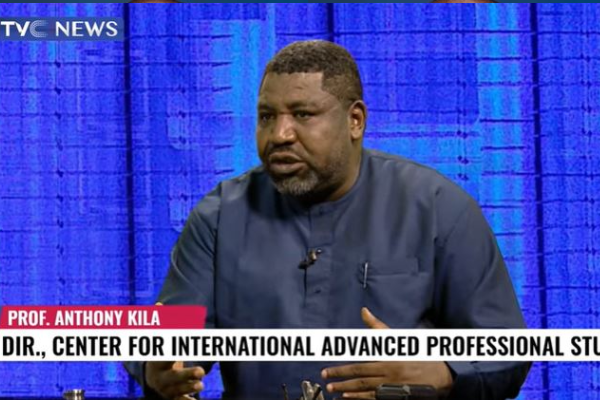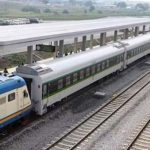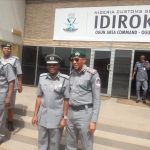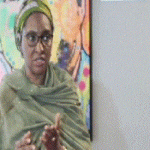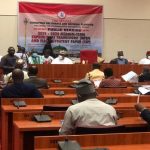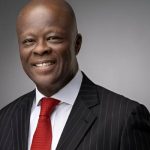Director, Centre for International Advanced and Professional Studies, Anthony Kila has reacted to the decision of the National Broadcasting Commission (NBC) to revoke the licences of 52 Radio and Television Stations across the country.
Mr Kila who is also a professor of strategy said the NBC should look for alternative ways of generating revenue for itself instead of thinking media stations were some of kind of taps they can ‘turn on and off.’
He stated this Monday on TVC’s Breakfast show with Sam Omatseye and Veronica Dan-Ikpoyi.
The CIAPS director added that the commission must be creative in the same manner Department, Ministries and other agencies are advised to be innovative.
[wonderplugin_video iframe=”https://youtu.be/ilEJjM5L_rg” lightbox=0 lightboxsize=1 lightboxwidth=960 lightboxheight=540 autoopen=0 autoopendelay=0 autoclose=0 lightboxtitle=”” lightboxgroup=”” lightboxshownavigation=0 showimage=”” lightboxoptions=”” videowidth=600 videoheight=400 keepaspectratio=1 autoplay=0 loop=0 videocss=”position:relative;display:block;background-color:#000;overflow:hidden;max-width:100%;margin:0 auto;” playbutton=”https://www.tvcnews.tv/wp-content/plugins/wonderplugin-video-embed/engine/playvideo-64-64-0.png”]
Mr Kila went on to say that instead of taxing people, revenue could be generated by providing services that people can see what they are paying for.
“Regulators must recognise that their current position is precarious, they are not really adding significant value, and they need to be very careful on how they tread”
Responding to the issue of media gagging which has become a reflection of the fact that Nigerians no longer trust government when it comes to addressing media matters, Prof, Kila said the connection between the government and the media is one of the things that has not gone well in the last 7-10 years, but has gotten worse in the last 5 years.
“Government agencies have come out numerous times to ban, warn, and fine media outlets; but, I believe there are better methods to address disputes informally, even if the government has good intentions”.
The CIAPS director who also spoke on the documentary aired by BBC on banditry noted that what matters is the news item, and its relevance.
He further added that “The decision to remove licenses for major media outlets in the country was a sad event.
“It is a bad outcome for everybody, operators must pay their dues, whether it is license or tax, that is a basic thing.
“We also need to curb the tendency where regulators tend to show their face when they impede, rather than when they allow operators to flow.
“The decision to manage revoked licenses is financial, political and economical.
Mr. Kila added that it is bad if media houses are not paying their license dues but government has to also take into account the consequences of their actions on the lives of staff of these affected organisations as well as their families.
” For those agencies who are unable to pay, we don’t allow them to walk away, outstanding fees can be negotiated, agreements can reached. Accounts can be frozen but ensure they keep operating.
“This is a time to grow companies not impede their operations.”
The NBC has given impacted media organisations until Tuesday at 6p.m to settle their debts following the intervention of the Nigerian Chapter of the International Press Institute
Director, Centre for International Advanced and Professional Studies, Anthony Kila has reacted to the decision of the National Broadcasting Commission (NBC) to revoke the licences of 52 Radio and Television Stations across the country.
Mr Kila who is also a professor of strategy said the NBC should look for alternative ways of generating revenue for itself instead of thinking media stations were some of kind of taps they can ‘turn on and off.’
He stated this Monday on TVC’s Breakfast show with Sam Omatseye and Veronica Dan-Ikpoyi.
The CIAPS director added that the commission must be creative in the same manner Department, Ministries and other agencies are advised to be innovative.
[wonderplugin_video iframe=”https://youtu.be/ilEJjM5L_rg” lightbox=0 lightboxsize=1 lightboxwidth=960 lightboxheight=540 autoopen=0 autoopendelay=0 autoclose=0 lightboxtitle=”” lightboxgroup=”” lightboxshownavigation=0 showimage=”” lightboxoptions=”” videowidth=600 videoheight=400 keepaspectratio=1 autoplay=0 loop=0 videocss=”position:relative;display:block;background-color:#000;overflow:hidden;max-width:100%;margin:0 auto;” playbutton=”https://www.tvcnews.tv/wp-content/plugins/wonderplugin-video-embed/engine/playvideo-64-64-0.png”]
Mr Kila went on to say that instead of taxing people, revenue could be generated by providing services that people can see what they are paying for.
“Regulators must recognise that their current position is precarious, they are not really adding significant value, and they need to be very careful on how they tread”
Responding to the issue of media gagging which has become a reflection of the fact that Nigerians no longer trust government when it comes to addressing media matters, Prof, Kila said the connection between the government and the media is one of the things that has not gone well in the last 7-10 years, but has gotten worse in the last 5 years.
“Government agencies have come out numerous times to ban, warn, and fine media outlets; but, I believe there are better methods to address disputes informally, even if the government has good intentions”.
The CIAPS director who also spoke on the documentary aired by BBC on banditry noted that what matters is the news item, and its relevance.
He further added that “The decision to remove licenses for major media outlets in the country was a sad event.
“It is a bad outcome for everybody, operators must pay their dues, whether it is license or tax, that is a basic thing.
“We also need to curb the tendency where regulators tend to show their face when they impede, rather than when they allow operators to flow.
“The decision to manage revoked licenses is financial, political and economical.
Mr. Kila added that it is bad if media houses are not paying their license dues but government has to also take into account the consequences of their actions on the lives of staff of these affected organisations as well as their families.
” For those agencies who are unable to pay, we don’t allow them to walk away, outstanding fees can be negotiated, agreements can reached. Accounts can be frozen but ensure they keep operating.
“This is a time to grow companies not impede their operations.”
The NBC has given impacted media organisations until Tuesday at 6p.m to settle their debts following the intervention of the Nigerian Chapter of the International Press Institute
Director, Centre for International Advanced and Professional Studies, Anthony Kila has reacted to the decision of the National Broadcasting Commission (NBC) to revoke the licences of 52 Radio and Television Stations across the country.
Mr Kila who is also a professor of strategy said the NBC should look for alternative ways of generating revenue for itself instead of thinking media stations were some of kind of taps they can ‘turn on and off.’
He stated this Monday on TVC’s Breakfast show with Sam Omatseye and Veronica Dan-Ikpoyi.
The CIAPS director added that the commission must be creative in the same manner Department, Ministries and other agencies are advised to be innovative.
[wonderplugin_video iframe=”https://youtu.be/ilEJjM5L_rg” lightbox=0 lightboxsize=1 lightboxwidth=960 lightboxheight=540 autoopen=0 autoopendelay=0 autoclose=0 lightboxtitle=”” lightboxgroup=”” lightboxshownavigation=0 showimage=”” lightboxoptions=”” videowidth=600 videoheight=400 keepaspectratio=1 autoplay=0 loop=0 videocss=”position:relative;display:block;background-color:#000;overflow:hidden;max-width:100%;margin:0 auto;” playbutton=”https://www.tvcnews.tv/wp-content/plugins/wonderplugin-video-embed/engine/playvideo-64-64-0.png”]
Mr Kila went on to say that instead of taxing people, revenue could be generated by providing services that people can see what they are paying for.
“Regulators must recognise that their current position is precarious, they are not really adding significant value, and they need to be very careful on how they tread”
Responding to the issue of media gagging which has become a reflection of the fact that Nigerians no longer trust government when it comes to addressing media matters, Prof, Kila said the connection between the government and the media is one of the things that has not gone well in the last 7-10 years, but has gotten worse in the last 5 years.
“Government agencies have come out numerous times to ban, warn, and fine media outlets; but, I believe there are better methods to address disputes informally, even if the government has good intentions”.
The CIAPS director who also spoke on the documentary aired by BBC on banditry noted that what matters is the news item, and its relevance.
He further added that “The decision to remove licenses for major media outlets in the country was a sad event.
“It is a bad outcome for everybody, operators must pay their dues, whether it is license or tax, that is a basic thing.
“We also need to curb the tendency where regulators tend to show their face when they impede, rather than when they allow operators to flow.
“The decision to manage revoked licenses is financial, political and economical.
Mr. Kila added that it is bad if media houses are not paying their license dues but government has to also take into account the consequences of their actions on the lives of staff of these affected organisations as well as their families.
” For those agencies who are unable to pay, we don’t allow them to walk away, outstanding fees can be negotiated, agreements can reached. Accounts can be frozen but ensure they keep operating.
“This is a time to grow companies not impede their operations.”
The NBC has given impacted media organisations until Tuesday at 6p.m to settle their debts following the intervention of the Nigerian Chapter of the International Press Institute
Director, Centre for International Advanced and Professional Studies, Anthony Kila has reacted to the decision of the National Broadcasting Commission (NBC) to revoke the licences of 52 Radio and Television Stations across the country.
Mr Kila who is also a professor of strategy said the NBC should look for alternative ways of generating revenue for itself instead of thinking media stations were some of kind of taps they can ‘turn on and off.’
He stated this Monday on TVC’s Breakfast show with Sam Omatseye and Veronica Dan-Ikpoyi.
The CIAPS director added that the commission must be creative in the same manner Department, Ministries and other agencies are advised to be innovative.
[wonderplugin_video iframe=”https://youtu.be/ilEJjM5L_rg” lightbox=0 lightboxsize=1 lightboxwidth=960 lightboxheight=540 autoopen=0 autoopendelay=0 autoclose=0 lightboxtitle=”” lightboxgroup=”” lightboxshownavigation=0 showimage=”” lightboxoptions=”” videowidth=600 videoheight=400 keepaspectratio=1 autoplay=0 loop=0 videocss=”position:relative;display:block;background-color:#000;overflow:hidden;max-width:100%;margin:0 auto;” playbutton=”https://www.tvcnews.tv/wp-content/plugins/wonderplugin-video-embed/engine/playvideo-64-64-0.png”]
Mr Kila went on to say that instead of taxing people, revenue could be generated by providing services that people can see what they are paying for.
“Regulators must recognise that their current position is precarious, they are not really adding significant value, and they need to be very careful on how they tread”
Responding to the issue of media gagging which has become a reflection of the fact that Nigerians no longer trust government when it comes to addressing media matters, Prof, Kila said the connection between the government and the media is one of the things that has not gone well in the last 7-10 years, but has gotten worse in the last 5 years.
“Government agencies have come out numerous times to ban, warn, and fine media outlets; but, I believe there are better methods to address disputes informally, even if the government has good intentions”.
The CIAPS director who also spoke on the documentary aired by BBC on banditry noted that what matters is the news item, and its relevance.
He further added that “The decision to remove licenses for major media outlets in the country was a sad event.
“It is a bad outcome for everybody, operators must pay their dues, whether it is license or tax, that is a basic thing.
“We also need to curb the tendency where regulators tend to show their face when they impede, rather than when they allow operators to flow.
“The decision to manage revoked licenses is financial, political and economical.
Mr. Kila added that it is bad if media houses are not paying their license dues but government has to also take into account the consequences of their actions on the lives of staff of these affected organisations as well as their families.
” For those agencies who are unable to pay, we don’t allow them to walk away, outstanding fees can be negotiated, agreements can reached. Accounts can be frozen but ensure they keep operating.
“This is a time to grow companies not impede their operations.”
The NBC has given impacted media organisations until Tuesday at 6p.m to settle their debts following the intervention of the Nigerian Chapter of the International Press Institute
Director, Centre for International Advanced and Professional Studies, Anthony Kila has reacted to the decision of the National Broadcasting Commission (NBC) to revoke the licences of 52 Radio and Television Stations across the country.
Mr Kila who is also a professor of strategy said the NBC should look for alternative ways of generating revenue for itself instead of thinking media stations were some of kind of taps they can ‘turn on and off.’
He stated this Monday on TVC’s Breakfast show with Sam Omatseye and Veronica Dan-Ikpoyi.
The CIAPS director added that the commission must be creative in the same manner Department, Ministries and other agencies are advised to be innovative.
[wonderplugin_video iframe=”https://youtu.be/ilEJjM5L_rg” lightbox=0 lightboxsize=1 lightboxwidth=960 lightboxheight=540 autoopen=0 autoopendelay=0 autoclose=0 lightboxtitle=”” lightboxgroup=”” lightboxshownavigation=0 showimage=”” lightboxoptions=”” videowidth=600 videoheight=400 keepaspectratio=1 autoplay=0 loop=0 videocss=”position:relative;display:block;background-color:#000;overflow:hidden;max-width:100%;margin:0 auto;” playbutton=”https://www.tvcnews.tv/wp-content/plugins/wonderplugin-video-embed/engine/playvideo-64-64-0.png”]
Mr Kila went on to say that instead of taxing people, revenue could be generated by providing services that people can see what they are paying for.
“Regulators must recognise that their current position is precarious, they are not really adding significant value, and they need to be very careful on how they tread”
Responding to the issue of media gagging which has become a reflection of the fact that Nigerians no longer trust government when it comes to addressing media matters, Prof, Kila said the connection between the government and the media is one of the things that has not gone well in the last 7-10 years, but has gotten worse in the last 5 years.
“Government agencies have come out numerous times to ban, warn, and fine media outlets; but, I believe there are better methods to address disputes informally, even if the government has good intentions”.
The CIAPS director who also spoke on the documentary aired by BBC on banditry noted that what matters is the news item, and its relevance.
He further added that “The decision to remove licenses for major media outlets in the country was a sad event.
“It is a bad outcome for everybody, operators must pay their dues, whether it is license or tax, that is a basic thing.
“We also need to curb the tendency where regulators tend to show their face when they impede, rather than when they allow operators to flow.
“The decision to manage revoked licenses is financial, political and economical.
Mr. Kila added that it is bad if media houses are not paying their license dues but government has to also take into account the consequences of their actions on the lives of staff of these affected organisations as well as their families.
” For those agencies who are unable to pay, we don’t allow them to walk away, outstanding fees can be negotiated, agreements can reached. Accounts can be frozen but ensure they keep operating.
“This is a time to grow companies not impede their operations.”
The NBC has given impacted media organisations until Tuesday at 6p.m to settle their debts following the intervention of the Nigerian Chapter of the International Press Institute
Director, Centre for International Advanced and Professional Studies, Anthony Kila has reacted to the decision of the National Broadcasting Commission (NBC) to revoke the licences of 52 Radio and Television Stations across the country.
Mr Kila who is also a professor of strategy said the NBC should look for alternative ways of generating revenue for itself instead of thinking media stations were some of kind of taps they can ‘turn on and off.’
He stated this Monday on TVC’s Breakfast show with Sam Omatseye and Veronica Dan-Ikpoyi.
The CIAPS director added that the commission must be creative in the same manner Department, Ministries and other agencies are advised to be innovative.
[wonderplugin_video iframe=”https://youtu.be/ilEJjM5L_rg” lightbox=0 lightboxsize=1 lightboxwidth=960 lightboxheight=540 autoopen=0 autoopendelay=0 autoclose=0 lightboxtitle=”” lightboxgroup=”” lightboxshownavigation=0 showimage=”” lightboxoptions=”” videowidth=600 videoheight=400 keepaspectratio=1 autoplay=0 loop=0 videocss=”position:relative;display:block;background-color:#000;overflow:hidden;max-width:100%;margin:0 auto;” playbutton=”https://www.tvcnews.tv/wp-content/plugins/wonderplugin-video-embed/engine/playvideo-64-64-0.png”]
Mr Kila went on to say that instead of taxing people, revenue could be generated by providing services that people can see what they are paying for.
“Regulators must recognise that their current position is precarious, they are not really adding significant value, and they need to be very careful on how they tread”
Responding to the issue of media gagging which has become a reflection of the fact that Nigerians no longer trust government when it comes to addressing media matters, Prof, Kila said the connection between the government and the media is one of the things that has not gone well in the last 7-10 years, but has gotten worse in the last 5 years.
“Government agencies have come out numerous times to ban, warn, and fine media outlets; but, I believe there are better methods to address disputes informally, even if the government has good intentions”.
The CIAPS director who also spoke on the documentary aired by BBC on banditry noted that what matters is the news item, and its relevance.
He further added that “The decision to remove licenses for major media outlets in the country was a sad event.
“It is a bad outcome for everybody, operators must pay their dues, whether it is license or tax, that is a basic thing.
“We also need to curb the tendency where regulators tend to show their face when they impede, rather than when they allow operators to flow.
“The decision to manage revoked licenses is financial, political and economical.
Mr. Kila added that it is bad if media houses are not paying their license dues but government has to also take into account the consequences of their actions on the lives of staff of these affected organisations as well as their families.
” For those agencies who are unable to pay, we don’t allow them to walk away, outstanding fees can be negotiated, agreements can reached. Accounts can be frozen but ensure they keep operating.
“This is a time to grow companies not impede their operations.”
The NBC has given impacted media organisations until Tuesday at 6p.m to settle their debts following the intervention of the Nigerian Chapter of the International Press Institute
Director, Centre for International Advanced and Professional Studies, Anthony Kila has reacted to the decision of the National Broadcasting Commission (NBC) to revoke the licences of 52 Radio and Television Stations across the country.
Mr Kila who is also a professor of strategy said the NBC should look for alternative ways of generating revenue for itself instead of thinking media stations were some of kind of taps they can ‘turn on and off.’
He stated this Monday on TVC’s Breakfast show with Sam Omatseye and Veronica Dan-Ikpoyi.
The CIAPS director added that the commission must be creative in the same manner Department, Ministries and other agencies are advised to be innovative.
[wonderplugin_video iframe=”https://youtu.be/ilEJjM5L_rg” lightbox=0 lightboxsize=1 lightboxwidth=960 lightboxheight=540 autoopen=0 autoopendelay=0 autoclose=0 lightboxtitle=”” lightboxgroup=”” lightboxshownavigation=0 showimage=”” lightboxoptions=”” videowidth=600 videoheight=400 keepaspectratio=1 autoplay=0 loop=0 videocss=”position:relative;display:block;background-color:#000;overflow:hidden;max-width:100%;margin:0 auto;” playbutton=”https://www.tvcnews.tv/wp-content/plugins/wonderplugin-video-embed/engine/playvideo-64-64-0.png”]
Mr Kila went on to say that instead of taxing people, revenue could be generated by providing services that people can see what they are paying for.
“Regulators must recognise that their current position is precarious, they are not really adding significant value, and they need to be very careful on how they tread”
Responding to the issue of media gagging which has become a reflection of the fact that Nigerians no longer trust government when it comes to addressing media matters, Prof, Kila said the connection between the government and the media is one of the things that has not gone well in the last 7-10 years, but has gotten worse in the last 5 years.
“Government agencies have come out numerous times to ban, warn, and fine media outlets; but, I believe there are better methods to address disputes informally, even if the government has good intentions”.
The CIAPS director who also spoke on the documentary aired by BBC on banditry noted that what matters is the news item, and its relevance.
He further added that “The decision to remove licenses for major media outlets in the country was a sad event.
“It is a bad outcome for everybody, operators must pay their dues, whether it is license or tax, that is a basic thing.
“We also need to curb the tendency where regulators tend to show their face when they impede, rather than when they allow operators to flow.
“The decision to manage revoked licenses is financial, political and economical.
Mr. Kila added that it is bad if media houses are not paying their license dues but government has to also take into account the consequences of their actions on the lives of staff of these affected organisations as well as their families.
” For those agencies who are unable to pay, we don’t allow them to walk away, outstanding fees can be negotiated, agreements can reached. Accounts can be frozen but ensure they keep operating.
“This is a time to grow companies not impede their operations.”
The NBC has given impacted media organisations until Tuesday at 6p.m to settle their debts following the intervention of the Nigerian Chapter of the International Press Institute
Director, Centre for International Advanced and Professional Studies, Anthony Kila has reacted to the decision of the National Broadcasting Commission (NBC) to revoke the licences of 52 Radio and Television Stations across the country.
Mr Kila who is also a professor of strategy said the NBC should look for alternative ways of generating revenue for itself instead of thinking media stations were some of kind of taps they can ‘turn on and off.’
He stated this Monday on TVC’s Breakfast show with Sam Omatseye and Veronica Dan-Ikpoyi.
The CIAPS director added that the commission must be creative in the same manner Department, Ministries and other agencies are advised to be innovative.
[wonderplugin_video iframe=”https://youtu.be/ilEJjM5L_rg” lightbox=0 lightboxsize=1 lightboxwidth=960 lightboxheight=540 autoopen=0 autoopendelay=0 autoclose=0 lightboxtitle=”” lightboxgroup=”” lightboxshownavigation=0 showimage=”” lightboxoptions=”” videowidth=600 videoheight=400 keepaspectratio=1 autoplay=0 loop=0 videocss=”position:relative;display:block;background-color:#000;overflow:hidden;max-width:100%;margin:0 auto;” playbutton=”https://www.tvcnews.tv/wp-content/plugins/wonderplugin-video-embed/engine/playvideo-64-64-0.png”]
Mr Kila went on to say that instead of taxing people, revenue could be generated by providing services that people can see what they are paying for.
“Regulators must recognise that their current position is precarious, they are not really adding significant value, and they need to be very careful on how they tread”
Responding to the issue of media gagging which has become a reflection of the fact that Nigerians no longer trust government when it comes to addressing media matters, Prof, Kila said the connection between the government and the media is one of the things that has not gone well in the last 7-10 years, but has gotten worse in the last 5 years.
“Government agencies have come out numerous times to ban, warn, and fine media outlets; but, I believe there are better methods to address disputes informally, even if the government has good intentions”.
The CIAPS director who also spoke on the documentary aired by BBC on banditry noted that what matters is the news item, and its relevance.
He further added that “The decision to remove licenses for major media outlets in the country was a sad event.
“It is a bad outcome for everybody, operators must pay their dues, whether it is license or tax, that is a basic thing.
“We also need to curb the tendency where regulators tend to show their face when they impede, rather than when they allow operators to flow.
“The decision to manage revoked licenses is financial, political and economical.
Mr. Kila added that it is bad if media houses are not paying their license dues but government has to also take into account the consequences of their actions on the lives of staff of these affected organisations as well as their families.
” For those agencies who are unable to pay, we don’t allow them to walk away, outstanding fees can be negotiated, agreements can reached. Accounts can be frozen but ensure they keep operating.
“This is a time to grow companies not impede their operations.”
The NBC has given impacted media organisations until Tuesday at 6p.m to settle their debts following the intervention of the Nigerian Chapter of the International Press Institute

